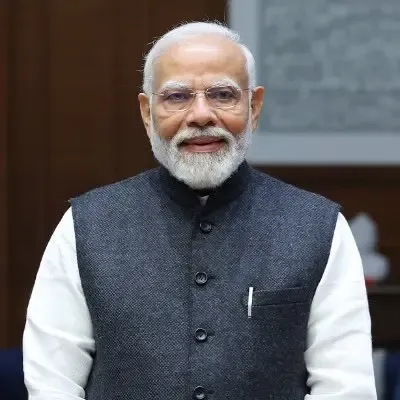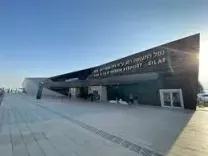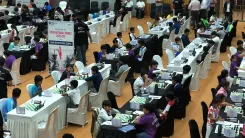PM Modi: DBT Scheme Promotes Transparency and Reduces Corruption

Synopsis
Key Takeaways
- DBT has disbursed over Rs 43.3 lakh crore.
- Direct transfers have curbed corruption and eliminated middlemen.
- Beneficiary coverage expanded from 11 crore to 176 crore.
- Subsidy allocations reduced from 16% to 9% of total expenditure.
- Aadhaar authentication eliminated ghost beneficiaries.
New Delhi, April 20 (NationPress) Prime Minister Narendra Modi stated that the Direct Benefit Transfer (DBT) scheme has successfully disbursed over Rs 43.3 lakh crore to date, effectively reducing corruption observed in previous administrations. This initiative has transformed welfare distribution by enhancing transparency, minimizing leakages, and ensuring accurate fund allocation.
While addressing an event hosted by India TV, PM Modi referenced former Prime Minister Rajiv Gandhi's assertion that only a small portion of funds—merely 15 paise out of every rupee—actually reached the intended beneficiaries of welfare programs.
“Currently, the DBT program has significantly reduced corruption and eliminated middlemen, benefiting millions from the underprivileged sectors,” the Prime Minister noted.
In the fiscal year 2025, the government’s direct subsidy transfers via DBT exceeded Rs 6.56 lakh crore.
In February, PM Modi disbursed the 19th installment of the Pradhan Mantri Kisan Samman Nidhi (PM-KISAN) scheme, providing 9.8 crore farmers with direct financial aid exceeding Rs 22,000 crore through DBT, all without any middleman involvement.
A recent report indicates that the DBT framework has yielded cumulative savings of Rs 3.48 lakh crore by significantly reducing prior leakages, while expanding beneficiary coverage from 11 crore to a remarkable 176 crore since its inception under PM Modi’s leadership.
As funds are directly deposited into the beneficiaries' bank accounts, leakages have diminished, resulting in a reduction of subsidy allocations from 16% to 9% of total expenditure.
“The DBT has transformed welfare distribution by improving transparency, curbing leakages, and facilitating accurate fund distribution,” the report highlighted.
This policy analysis reviews a decade of data (2009–2024) to evaluate the impact of DBT on budgetary effectiveness, subsidy rationalization, and social outcomes.
The newly introduced Welfare Efficiency Index (WEI), which measures fiscal and social benefits, increased from 0.32 in 2014 to 0.91 in 2023, indicating substantial systemic advancements, according to the document.
Despite welfare budgets rising from Rs 2.1 lakh crore in 2009–10 to Rs 8.5 lakh crore in 2023–24, subsidy allocations have proportionally declined, showcasing the efficiency driven by DBT.
Aadhaar-linked verification has eradicated ghost beneficiaries, enabling coverage expansion without a corresponding increase in fiscal spending.








